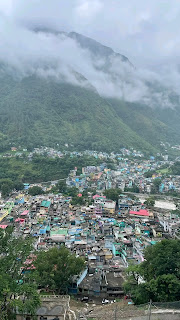My column Zara Hatke in Midday today ..:
DREAMLINER NIGHTMARE
We were Ahmedabad headed, Bugs Bhargava Krishna, myself, and the rest of our team who handle the Amul account -- the airport seemed a bit deserted that Thursday afternoon. We were early, so we settled into the lounge area of T1, waiting to board. The 3.15 pm Ahmedabad flight was ready, the announcement said, the TV screens surrounding us all over the lounge, thankfully on mute, had the usual excited, exuberant anchors, telling us about the world at large. And suddenly as we arose, to join the queue, the myriad screens around the airport, told us a chilling story, images of a plane, an Air India Boeing exploding close to Ahmedabad airport, in Meghani Nagar. To see that disaster on loop, a plane suddenly human, unable to climb, desperate but beginning to descend, lost behind some roofs and then a gigantic explosion -- our first instinct, we were definitely not going to make it to Ahmedabad that afternoon.
The stories came filtering through, of the faults with the aircraft, the fissures that had developed, the flaps that wouldn’t open – and then to the families and the lives lost. Somehow with air disasters, my interest always goes to the cabin crew. And the pilots, always the first to detect the danger.
Pilots, I’ve always admired, that they carry the lives of so many passengers in their hands, safe take-offs and smooth landings, and when there are disasters, all eyes turn to them, the men and women, commandeering the plane. In this case Sumeet Sabharwal, the first officer, the Noah of this aircraft, mid 50s, sacrificed marriage and family to take care of his ailing father, was set to retire for the same reason, at that moment, 300 feet above the ground, in those 32 seconds, unable to lift higher, that cry out of “mayday”, in that instant, when climbing had turned to descent, that realisation that the end was near, for himself, for his co-pilot, his cabin crew and the 242 passengers in his care, desperation even at that height, to land in a less populated area, the tragic irony that he had to land on a medical hostel.
The victims, each one with a backstory, mostly of hope and success and new beginnings -- leaving behind old parents, orphans, one-year-olds. And the cabin crew, our national airline for all its problems, its staff, always believes in service with a smile.
The Boeing Dreamliner 171. Carrying dreams of 200 passengers, from Gujarat to Gatwick, mothers flying to reunite with daughters, families on a one way ticket, a nine hour flight to their promised land. Expectations, excitement, ending in a few seconds.
The Dreamliner, 200 dreams reduced to rubble. Life is fleeting. The Maharaja weeps. Dreams have flatlined.
‐----
In Eternal Remembrance of the Crew of Air India Flight 171
A Tribute to Those Who Soared for Us All
On the morning of June 12, 2025, a heartbreaking chapter was written in the skies above Ahmedabad. Air India Flight 171, a Boeing 787 Dreamliner, embarked on what was meant to be a routine journey to London Gatwick. Tragically, the aircraft never reached its destination. Just minutes after takeoff, the flight encountered critical failure, leading to a devastating crash that claimed the lives of 241 souls on board — among them, 12 beloved crew members.
This catastrophic event marked a dark milestone in aviation history. Beyond the statistics, it was a deeply personal loss — for families, friends, colleagues, and passengers who placed their trust in those dedicated professionals. The crew of AI-171 were more than uniforms. They were leaders, dreamers, protectors, and ambassadors of the skies.
---
✈️ Honoring the Crew of AI-171
🧭 Flight Deck Heroes
Captain Sumeet Sabharwal (55, Mumbai)
A man whose very presence inspired confidence. With over 30 years in the cockpit, Capt. Sabharwal was known for his humility and skill. Passengers and crew alike found comfort in his command. He mentored dozens and flew with honor until his final flight.
First Officer Clive Kunder (32, Mangalore)
Bright-eyed and passionate, Clive represented the future of aviation. With a family rooted in flight, his path to the cockpit was one of purpose. He embraced each mission with heart, bringing integrity and vision to every mile flown.
---
💼 Cabin Crew: The Heart of Every Journey
Manisha Thapa (27, Patna)
Known for her warmth and professionalism, Manisha had served in aviation across various airlines before joining Air India. Her grace and poise left a mark on colleagues and passengers from every corner of the world.
Kongbrailatpam Nganthoi Sharma (22, Manipur)
Affectionately called “Nganthoi” by friends, she was the spirit of optimism and energy. Her laughter was unforgettable, her dreams unshakable. Though her time was brief, her impact was profound.
Maithili Moreshwar Patil (22, Nhava, Maharashtra)
Born and raised in a coastal village, Maithili’s journey to the skies inspired all who knew her. She flew not just for herself, but for the pride of her family and the hopes of her community.
Irfan Shaikh (22, Pune)
A kind soul with a deep love for people and service, Irfan was the kind of crew member who made every passenger feel seen. He believed in dignity, compassion, and quiet strength.
Shraddha Dhavan (44, Mumbai)
With over two decades of flying experience, Shraddha was a matriarch in the air. She guided countless young crew members, offering support and wisdom like a sister and mentor rolled into one.
Aparna Mahadik (42, Mumbai)
Strong, calm, and fiercely dedicated. Aparna was known for leading with integrity and discipline. She embraced fitness and mental well-being, believing it made her a better caregiver in the sky.
Deepak Pathak (36, Badlapur)
With over a decade in service, Deepak was the silent guardian of the cabin. His calm demeanor, reliability, and attention to detail made him a pillar of strength in turbulent moments.
Roshni Songhare (27, Dombivli)
Bubbling with positivity, Roshni was a traveler, a creator, and a friend to many. Engaged to be married, she was planning a life filled with dreams — which she now shares with the sky.
Lamnunthem Singson (24, Manipur)
Fresh to the field but rich in passion, Lamnunthem brought cultural grace and youthful joy to every flight. She flew with hope, eager to explore the world and uplift her homeland.
Saineeta Chakravarty (35, Mumbai)
Elegant, composed, and deeply respected, Saineeta joined Air India after years of experience with other carriers. She brought a seasoned professionalism to the crew and held herself to the highest standards.
---
🕊️ They Were More Than Their Uniforms
These men and women were more than just crew. They were dreamers, nurturers, protectors, and leaders. They did not just serve passengers — they carried stories, stitched destinies, and gave meaning to the journey between places and people.
Their legacy is one of devotion, courage, and grace under pressure. In life, they helped others reach their destinations. In passing, they remind us how fragile and precious every flight, every hello, and every goodbye truly is.
Though the clouds may have closed over Flight 171, the memory of these 12 shining souls will forever illuminate the skies.
Let us keep their spirits alive — not with silence, but with gratitude. Not with sorrow alone, but with resolve to honor them through kindness, remembrance, and unity.
---
📍Forever Remembered. Forever Respected. Forever United by Wings.



























